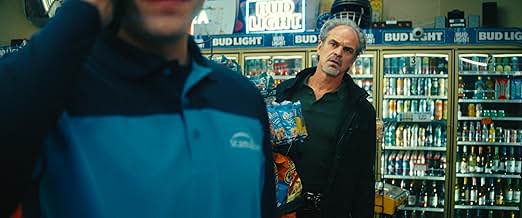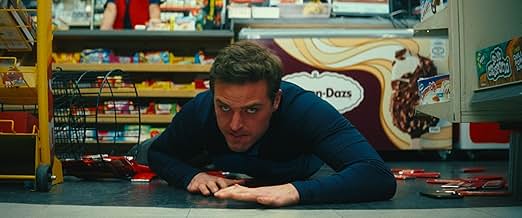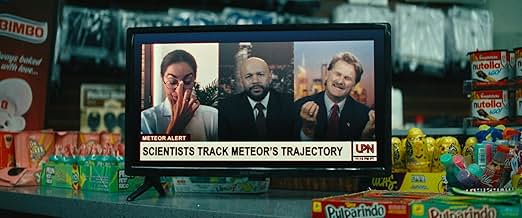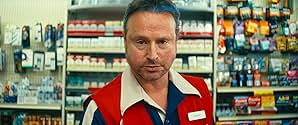A neurotic delivery driver named Owen battles his OCD at a local convenience store while his TikToker girlfriend plans an exposure therapy dinner date at home. But when she helps him resist ... Read allA neurotic delivery driver named Owen battles his OCD at a local convenience store while his TikToker girlfriend plans an exposure therapy dinner date at home. But when she helps him resist his compulsion, it subsequently triggers the apocalypse.A neurotic delivery driver named Owen battles his OCD at a local convenience store while his TikToker girlfriend plans an exposure therapy dinner date at home. But when she helps him resist his compulsion, it subsequently triggers the apocalypse.
- Awards
- 15 wins & 9 nominations total
Featured reviews
Luca Pizzoleo's O. C. D. Is a cinematic paradox: a film that laughs at the absurd while staring unflinchingly into the void of human fragility. At just 12 minutes, it's a rollercoaster of neurosis, humor, and existential dread-a darkly comedic thriller that doesn't just explore obsessive-compulsive disorder but cracks it open like a raw nerve, demanding we examine our relationship with control, anxiety, and the strange logic of compulsion.
The brilliance of O. C. D. Lies in its ability to transform the mundane into the catastrophic. The film doesn't present Owen's obsessive-compulsive disorder as a quirky personality quirk; instead, it embodies his struggle through the visceral mechanics of storytelling. When we meet Owen, played with unnerving authenticity by Raz Fritz, he's in the midst of an everyday battle: resisting his many urges to give order to the disorder. For Owen, this seemingly innocuous act isn't trivial-it's a matter of cosmic balance.
But the genius stroke of O. C. D. Is the introduction of "The Agent," played with devilish charm by Steven Ogg. The Agent isn't just a character; he's an idea-an externalized manifestation of Owen's inner torment. As a suave harbinger of entropy, The Agent reframes Owen's compulsions not as symptoms to overcome but as responsibilities to the universe itself. The film refracts the experience of OCD through this fantastical lens, showing how refusing to indulge a compulsion can feel like tempting fate, as though every unperformed ritual risks unraveling reality itself.
And then, reality does unravel.
The narrative's descent into chaos- a home explosion, armed criminals storming the gas station, and an imminent global collapse-is more than a clever metaphor for the protagonist's internal struggles. It's an amplification of the stakes for someone battling OCD. The external chaos mirrors Owen's internal war, where every suppressed compulsion feels like a seismic shift that could upend the universe.
The performances are crucial to grounding this madness. Fritz's Owen is jittery yet deeply sympathetic, a man caught in a losing battle against his own mind. Ariel Martin, as his well-meaning but oblivious TikToker girlfriend, serves as both a source of tension and a tragic figure, her attempts to "help" Owen ultimately backfiring with apocalyptic consequences.
Yet beneath the chaos lies a profound question: what happens when the rituals that keep us afloat threaten to drown us? O. C. D. Suggests that our compulsions, however irrational, serve a purpose-they create order in a world that often feels uncontrollable. The apocalypse Owen inadvertently triggers isn't just a narrative twist; it's a biting commentary on the human need to impose meaning on the meaningless.
Pizzoleo has crafted a film that defies categorization, blending dark comedy, psychological horror, and philosophical inquiry into a compact, explosive package. O. C. D. Doesn't just entertain-it unsettles, provokes, and lingers long after the credits roll. In resisting the urge to tie its narrative into a neat bow, the film becomes an unsettling mirror, reflecting our own fears, compulsions, and the fragile systems we build to hold our lives together.
And as Owen's world crumbles, we're left wondering: is it the apocalypse, or just Tuesday?
The brilliance of O. C. D. Lies in its ability to transform the mundane into the catastrophic. The film doesn't present Owen's obsessive-compulsive disorder as a quirky personality quirk; instead, it embodies his struggle through the visceral mechanics of storytelling. When we meet Owen, played with unnerving authenticity by Raz Fritz, he's in the midst of an everyday battle: resisting his many urges to give order to the disorder. For Owen, this seemingly innocuous act isn't trivial-it's a matter of cosmic balance.
But the genius stroke of O. C. D. Is the introduction of "The Agent," played with devilish charm by Steven Ogg. The Agent isn't just a character; he's an idea-an externalized manifestation of Owen's inner torment. As a suave harbinger of entropy, The Agent reframes Owen's compulsions not as symptoms to overcome but as responsibilities to the universe itself. The film refracts the experience of OCD through this fantastical lens, showing how refusing to indulge a compulsion can feel like tempting fate, as though every unperformed ritual risks unraveling reality itself.
And then, reality does unravel.
The narrative's descent into chaos- a home explosion, armed criminals storming the gas station, and an imminent global collapse-is more than a clever metaphor for the protagonist's internal struggles. It's an amplification of the stakes for someone battling OCD. The external chaos mirrors Owen's internal war, where every suppressed compulsion feels like a seismic shift that could upend the universe.
The performances are crucial to grounding this madness. Fritz's Owen is jittery yet deeply sympathetic, a man caught in a losing battle against his own mind. Ariel Martin, as his well-meaning but oblivious TikToker girlfriend, serves as both a source of tension and a tragic figure, her attempts to "help" Owen ultimately backfiring with apocalyptic consequences.
Yet beneath the chaos lies a profound question: what happens when the rituals that keep us afloat threaten to drown us? O. C. D. Suggests that our compulsions, however irrational, serve a purpose-they create order in a world that often feels uncontrollable. The apocalypse Owen inadvertently triggers isn't just a narrative twist; it's a biting commentary on the human need to impose meaning on the meaningless.
Pizzoleo has crafted a film that defies categorization, blending dark comedy, psychological horror, and philosophical inquiry into a compact, explosive package. O. C. D. Doesn't just entertain-it unsettles, provokes, and lingers long after the credits roll. In resisting the urge to tie its narrative into a neat bow, the film becomes an unsettling mirror, reflecting our own fears, compulsions, and the fragile systems we build to hold our lives together.
And as Owen's world crumbles, we're left wondering: is it the apocalypse, or just Tuesday?
For people suffering from obsessive-compulsive disorder, life can be hellish. The affliction leaves individuals crippled by anxiety and the unyielding need to perform rituals. These rituals, meant to ward off perceived threats, dominate daily life, making even simple tasks insurmountable. This relentless cycle of obsession and compulsion causes significant distress, creating an overwhelming sense that failure to complete these rituals will lead to catastrophic consequences, as if the world itself is about to end.
In Luca Pizzoleo's short film 'O. C. D. (Obsessor Coercio Deus),' this torment is brought to life through the story of Owen, a neurotic delivery driver plagued by severe O. C. D. While in a convenience store, on the phone to his girlfriend, his compulsions escalate, manifesting themselves in the form of a menacing man known as The Agent. As the situation spirals out of control, Owen feels that his whole life is falling apart, and that everything is on the line.
It is a tense descent into a compulsive mind. Pizzoleo's screenplay, written alongside Conor Patrick Walsh, paints a frightening portrait of one afflicted by O. C. D. Owen literally feels as if the world around him is ending, and this sense of impending doom permeates every scene. The narrative cleverly intertwines Owen's internal battles with external events, seamlessly melding fantasy and reality.
Proceedings boast a claustrophobic atmosphere, mirroring Owen's trapped mind, heightening the tension as his compulsions escalate. The Agent, as a manifestation of Owen's anxiety, serves as a constant, oppressive presence, underscoring the severity of his condition. The film skilfully navigates the thin line between reality and Owen's distorted perceptions, making one question what is real and what is a product of his disorder.
A darkly amusing look at the absurdities of living with O. C. D., Pizzoleo and Walsh use black comedy to underscore the ridiculous lengths Owen must go to placate his compulsions. Owen's interactions with everyday objects take on a comically exaggerated significance, transforming mundane tasks into epic battles.
Additionally, Pizzoleo and Walsh satirize the influencer culture through the vapid and vain character of Owen's girlfriend, more concerned with her social media presence than with Owen's well-being. Her superficiality contrasts sharply with Owen's intense internal struggle, adding another layer of irony to the narrative. The film cleverly critiques the often shallow and performative nature of social media, highlighting how it can trivialize serious issues like O. C. D.
Moreover, it is very well-edited, with quick cuts and rapid transitions, creating a relentless, frantic pace, mirroring the incessant, intrusive thoughts driving Owen's actions. This approach not only keeps one engaged, but also provides a visceral understanding of the perpetual state of distress experienced by those with O. C. D.
In addition, director of photography Jeremy Basset's claustrophobic cinematography, characterized by tight framing and dynamic lighting, effectively mirrors Owen's sense of entrapment. The sound design and Alexander Arntzen's intense score further amplify the pervasive sense of dread, drawing one further into Owen's tumultuous world and viscerally conveying his anxiety.
Raz Fritz stars as Owen, delivering a standout performance that captures the intense desperation of a man at war with his own mind. More than effectively conveying the relentless anxiety and overwhelming need to perform rituals that O. C. D. Victims face, Fritz is terrific. The great Steven Ogg is marvellously menacing as The Agent, carrying with him a foreboding aura of violence. Like a wolf let loose in a hen-house- you never know just what he'll do next; but you know it won't be pretty. In addition, Ariel Martin brings to life Owen's vacuous girlfriend with aplomb.
In conclusion, Luca Pizzoleo's 'O. C. D. (Obsessor Coercio Deus)' is a tense, exhilarating journey into the mind of someone battling severe O. C. D. The film expertly balances psychological horror with dark comedy, providing a nuanced and empathetic portrayal of the disorder. Well-edited, and with outstanding performances- particularly from Raz Fritz and Steven Ogg- as well a keenly observant script, this compulsively compelling short film is a must watch.
In Luca Pizzoleo's short film 'O. C. D. (Obsessor Coercio Deus),' this torment is brought to life through the story of Owen, a neurotic delivery driver plagued by severe O. C. D. While in a convenience store, on the phone to his girlfriend, his compulsions escalate, manifesting themselves in the form of a menacing man known as The Agent. As the situation spirals out of control, Owen feels that his whole life is falling apart, and that everything is on the line.
It is a tense descent into a compulsive mind. Pizzoleo's screenplay, written alongside Conor Patrick Walsh, paints a frightening portrait of one afflicted by O. C. D. Owen literally feels as if the world around him is ending, and this sense of impending doom permeates every scene. The narrative cleverly intertwines Owen's internal battles with external events, seamlessly melding fantasy and reality.
Proceedings boast a claustrophobic atmosphere, mirroring Owen's trapped mind, heightening the tension as his compulsions escalate. The Agent, as a manifestation of Owen's anxiety, serves as a constant, oppressive presence, underscoring the severity of his condition. The film skilfully navigates the thin line between reality and Owen's distorted perceptions, making one question what is real and what is a product of his disorder.
A darkly amusing look at the absurdities of living with O. C. D., Pizzoleo and Walsh use black comedy to underscore the ridiculous lengths Owen must go to placate his compulsions. Owen's interactions with everyday objects take on a comically exaggerated significance, transforming mundane tasks into epic battles.
Additionally, Pizzoleo and Walsh satirize the influencer culture through the vapid and vain character of Owen's girlfriend, more concerned with her social media presence than with Owen's well-being. Her superficiality contrasts sharply with Owen's intense internal struggle, adding another layer of irony to the narrative. The film cleverly critiques the often shallow and performative nature of social media, highlighting how it can trivialize serious issues like O. C. D.
Moreover, it is very well-edited, with quick cuts and rapid transitions, creating a relentless, frantic pace, mirroring the incessant, intrusive thoughts driving Owen's actions. This approach not only keeps one engaged, but also provides a visceral understanding of the perpetual state of distress experienced by those with O. C. D.
In addition, director of photography Jeremy Basset's claustrophobic cinematography, characterized by tight framing and dynamic lighting, effectively mirrors Owen's sense of entrapment. The sound design and Alexander Arntzen's intense score further amplify the pervasive sense of dread, drawing one further into Owen's tumultuous world and viscerally conveying his anxiety.
Raz Fritz stars as Owen, delivering a standout performance that captures the intense desperation of a man at war with his own mind. More than effectively conveying the relentless anxiety and overwhelming need to perform rituals that O. C. D. Victims face, Fritz is terrific. The great Steven Ogg is marvellously menacing as The Agent, carrying with him a foreboding aura of violence. Like a wolf let loose in a hen-house- you never know just what he'll do next; but you know it won't be pretty. In addition, Ariel Martin brings to life Owen's vacuous girlfriend with aplomb.
In conclusion, Luca Pizzoleo's 'O. C. D. (Obsessor Coercio Deus)' is a tense, exhilarating journey into the mind of someone battling severe O. C. D. The film expertly balances psychological horror with dark comedy, providing a nuanced and empathetic portrayal of the disorder. Well-edited, and with outstanding performances- particularly from Raz Fritz and Steven Ogg- as well a keenly observant script, this compulsively compelling short film is a must watch.
Did you know
Details
- Release date
- Country of origin
- Language
- Also known as
- Obsessor Coercio Deus
- Filming locations
- 11222 Vanowen St Los Angeles, California, USA(Convenience Store)
- Production company
- See more company credits at IMDbPro
- Runtime12 minutes
- Color
- Aspect ratio
- 2.35 : 1
Contribute to this page
Suggest an edit or add missing content


































